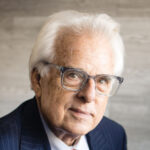One of the perks of what I do is becoming friends with some of the great thinkers of our time, and one of those is Leon Kass. Kass is the reigning intellectual champion for upholding intrinsic human dignity. He also served splendidly for about six years as the chairman of the President’s Council on Bioethics — receiving undeserved brickbats from the bioethical Left — despite, or perhaps better stated, because of — the Council’s incredibly good analytical work about the vexing bioethical issues of our time, including cloning, the definition of death, and the transhumanist impulse, among other issues.
Kass was recently interviewed by the Wall Street Journal. It is worth reading the whole thing, and one can see that he is no two-dimensional thinker falling lockstep into a specific ideological pigeon hole.
I thought two parts of the interview are particularly interesting for people interested in human exceptionalism. First, Kass revisits his idea of the “Wisdom of Repugnance,” first published in The New Republic (and well worth your time to read). From, “Leon Kass: The Meaning of the Gosnell Trial:”
These and other appalling details of the Gosnell trial elicit reactions that might be called revulsion or disgust or horror. The word that eminent bioethicist and physician Leon Kass prefers is “repugnance.” This intense human reaction reflects a sort of deep moral intuition, he says, and it is one that deserves much more serious consideration than our too-sophisticated culture allows.
“As pain is to the body so repugnance is to the soul,” Dr. Kass says as we sit down for an interview in his book-lined office at the American Enterprise Institute, where he is the Madden-Jewett Scholar. “So too with anger and compassion. Repugnance is some kind of wake-up call that there is something untoward going on and attention must be paid. These passions are not simply irrational. They contain within them the germ of insight. You cannot give proper verbal account of the horror of evil, yet a culture that couldn’t be absolutely horrified by such things is dead.”
Kass’s less intellectually endowed critics laughed at the “Wisdom of Repugnance,” claiming that revulsion isn’t an “argument.” Kass never said it was. But it is a human way of alerting us that something could be — not necessarily is — very wrong. And what is the alternative to being alert to the inner voice? Moral relativism and terminal non judgmentalism, which too often amount to the eschewing of morality.
Kass also takes acute aim at scientism:
“Unlike questions of segregation and, before it, slavery, where evil was clear and the only question was how to deal with it,” Dr. Kass says, “the evils that I saw close to my own area of work were ones that were embedded in very high-minded pursuits: better health, peace of mind and the conquest of nature. Yet they contained within them the seeds of our own degradation.” The trouble wasn’t so much with science itself, he thought, as with “scientism,” by which he means “a quasi-religious faith that scientific knowledge is the only knowledge worthy of the name; that scientific knowledge gives you an exhaustive account of the way things are; and that science will transcend all the limitations of our human condition, all of our miseries.” Scientism’s primary goal, Dr. Kass says, “is to put the final nail in the rule of revealed religion. But scientism also hits traditional, humanistic understandings of the special place of the human being, of the importance of soul, of inwardness and purposiveness.”
The idea that materialism “can cure men of the fear of God and the fear of death,” as Dr. Kass puts it, is at least as old as ancient Greece. But today it has become especially potent thanks to “the new genetics, which bore more deeply than ever before into the molecular basis of living processes.” Then there is the rise of neuroscience and evolutionary psychology, which purport to explain absolutely everything about human life in materialistic terms.
Such subversion of human exceptionalism is a dangerous game. But I am convinced that human dignity is the hill that can be defended successfully against the would-be new eugenicists. People just need to be awakened to the threat that this way comes. I just wish I were half as articulate as Leon Kass in raising the alarm.
Author Profile

Latest entries
- BlogJanuary 27, 2015Ready or Not: Here Comes 2015 in Bioethics!
- BlogOctober 20, 2014A Case of Surrogacy’s Gordian Knot
 BlogAugust 19, 2014Transhumanism’s Eugenic Authoritarianism
BlogAugust 19, 2014Transhumanism’s Eugenic Authoritarianism- BlogAugust 13, 2014Suicide Cult Pushes Home Made Suicide Kits


